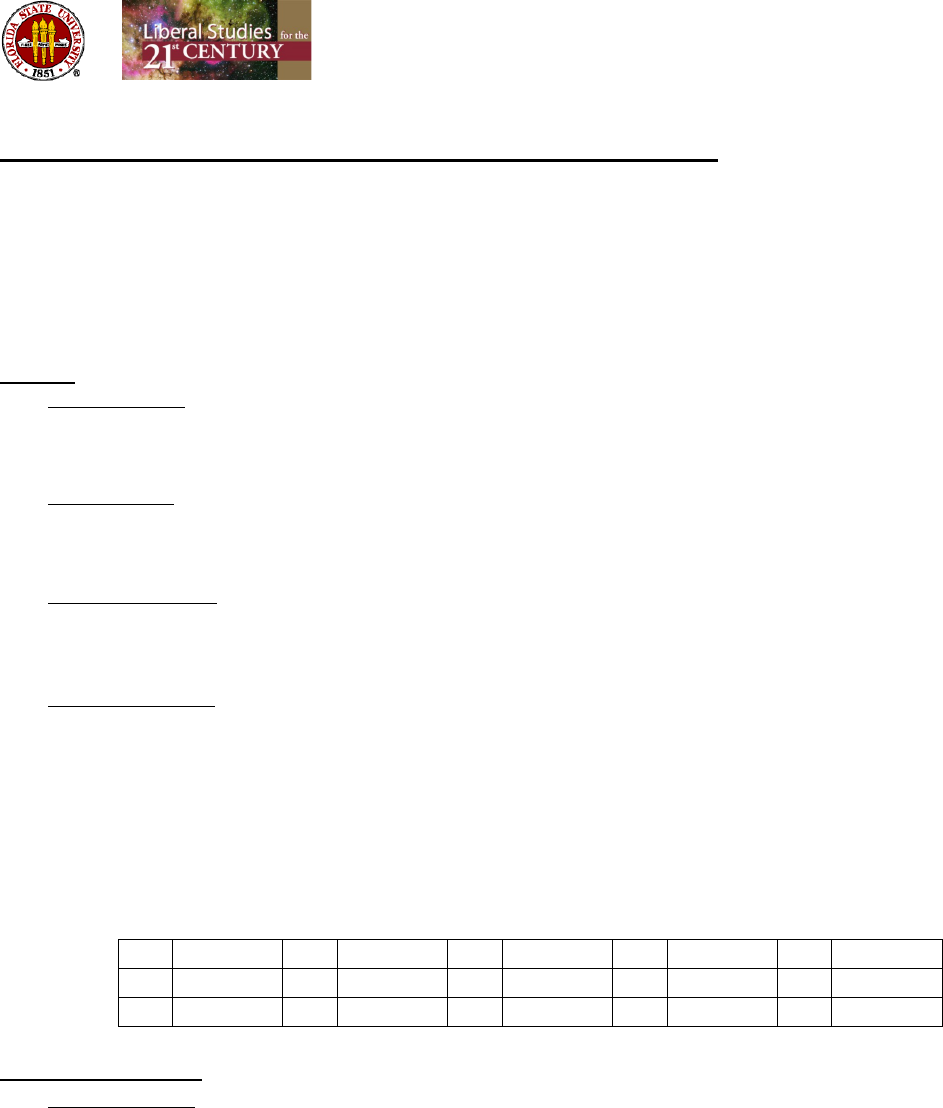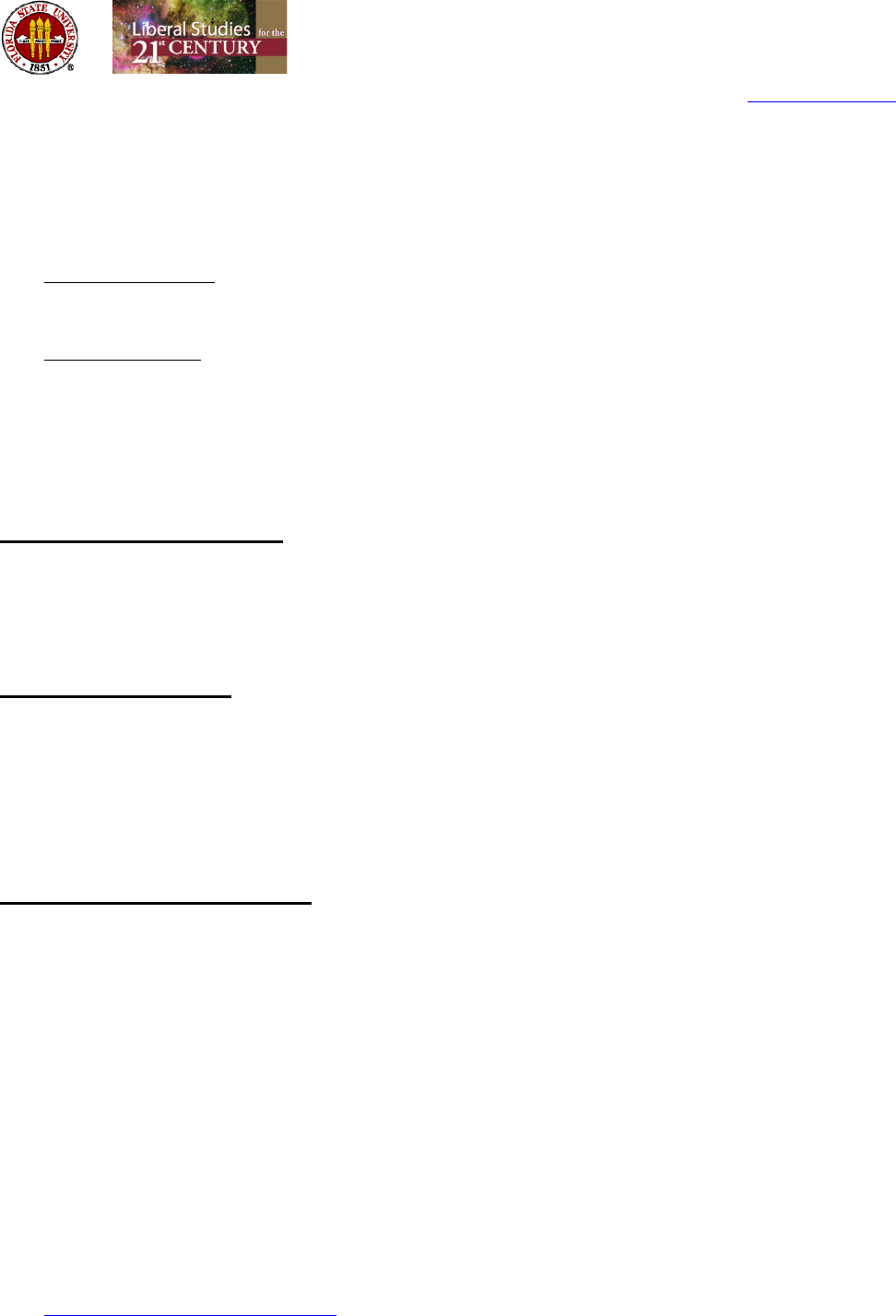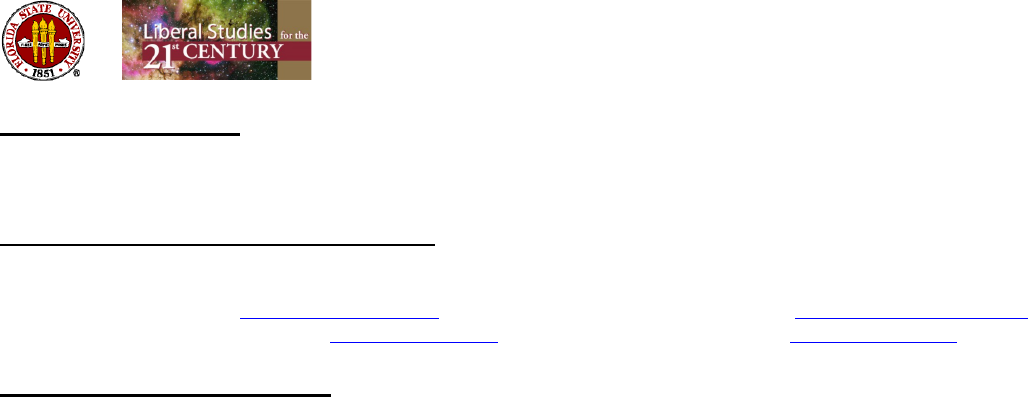
STA 1013 Spring 2019
Department of Statistics
Florida State University
STA 1013: Statistics Through Example
Spring 2019 – Section 0015
Course Information
Instructor: Zishen Xu
Email: [email protected]
Office Hours: Monday, 3:30 pm - 5:30 pm or by appointment
Office Location: Dirac 443 (use the elevator on the left after entering the first auto-door of the Dirac library)
Class Times and Locations: Jan 7
th
~ April 26
th
, MWF, 1:25 pm – 2:15 pm, TUL 2010
Required Course Resources
Textbook: There is no required textbook for this course. The notes and relevant materials will be posted to Canvas
before class. Some suggested readings are:
- Statistical Reasoning for everyday life, 5
th
ed. by Bennet Briggs Triola.
- Elementary Statistics, 7
th
ed, by Mario F. Triola
Calculator: A scientific calculator is required. Cell phones are not permitted as calculators during exams and quizzes.
Canvas Class Website: Grades, homework, notes, announcements and other pertinent information will be available
through this site. You are responsible for assignments and announcements posted on this website, as well as those
sent through your FSU email. Please check your FSU email and Canvas daily.
Course Description
Prerequisite: None
Credit Hours: 3
This course provides students with a background in applied statistical reasoning. Fundamental topics are covered
including graphical and numerical description of data, understanding randomness, central tendency, correlation
versus causation, line of best fit, estimation of proportions, and statistical testing.
Statistical thinking, relevant ideas, themes, and concepts are emphasized over mathematical calculation. In this class
students learn many of the elementary principles that underlie collecting data, organizing it, summarizing it, and
drawing conclusions from it.
Course Objectives:
This course has been approved to meet FSU’s Liberal Studies Quantitative and Logical Thinking requirements and is
designed to help you become a critical analyst of quantitative and logical claims. In order to fulfill the State of
Florida's College mathematics and computation requirement the student must earn a “C-” or better in the course.
By the end of the course, students will demonstrate the ability to:
1) Select and apply appropriate methods (i.e., mathematical, statistical, logical, and/or computational models or
principles) to solve real-world problems.
2) Use a variety of forms to represent problems and their solutions.
3) Apply sound concepts of sample selection and experimental design in producing data.
4) Use statistical thinking in the context of work processes, academic endeavors, and everyday life.
5) Describe how inferential statistical methods are used to make valid judgments based on the data.
6) Evaluate the validity of statistical results with skepticism based on sensible considerations.

STA 1013 Spring 2019
Department of Statistics
Florida State University
Tentative Topics:
1. Terminology/Initial Ideas: statistical study process, population, sample, parameter, statistic, categorical,
quantitative
2. Sampling: simple random sampling, systematic sampling, stratified sampling, cluster sampling, convenience
sampling
3. Graphs: histograms (sketch and interpret), stemplots (sketch and interpret), bar charts (sketch and interpret), pie
charts (interpret)
4. Summary Statistics: mode, mean, quartiles, range, standard deviation, five-number summary, boxplot
5. Empirical Rule
6. Normal Distributions: forward problems (finding area under the curve/percentage of data)
7. Central Limit Theorem: sampling distributions of x-bar, features of the distributions and implications when using
a larger/smaller sample to estimate mu, forward problems (finding probabilities)
8. Probability: random processes, four rules, probability models, addition rule for mutually exclusive events
9. Random Variables: definition, expected value
10. One-sample mean: obtain and interpret z-intervals, carry out and interpret results of z-test, interpret P-value
11. One-proportion: z-intervals and z-tests
12. Correlation: what the sign and absolute value of r imply, correlation does not imply cause-and-effect
13. Simple Linear Regression: read scatterplots, given equation make prediction, interpret R-squared
Tentative Pacing Schedule:
Mon
Wed
Fri
Week 1
Jan 7 ~ Jan 11
Introduction to the course
Topic 1 & 2
Topic 3
Week 2
Jan 14 ~ Jan 18
Topic 4
Topic 4
Topic 5
Week 3
Jan 21 ~ Jan 25
Martin Luther King, Jr. Day
No class
Topic 5
Review
Week 4
Jan 28 ~ Feb 1
Quiz 1
Topic 6
Topic 6
Week 5
Feb 4 ~ Feb 8
Topic 7
Topic 7
Topic 7
Week 6
Feb 11 ~ Feb 15
Topic 7
Topic 7
Review
Week 7
Feb 18 ~ Feb 22
Quiz 2
Topic 8
Topic 8
Last day to drop class
Week 8
Feb 25 ~ Mar 1
LSQA Test
Topic 8
Topic 8
Week 9
Mar 4 ~ Mar 8
Topic 9
Topic 9
Review
Week 10
Mar 11 ~ Mar 15
Quiz 3
Topic 10
Topic 10
Spring
Break
Mar 18 ~ Mar 22
No class
Week 11
Mar 25 ~ Mar 29
Topic 10
Topic 10
Topic 11
Week 12
Apr 1 ~ Apr 5
Topic 11
Topic 11
Review
Week 13
Apr 8 ~ Apr 12
Quiz 4
Topic 12
Topic 12
Week 14
Apr 15 ~ Apr 19
Topic 13
Topic 13
Topic 13
Week 15
Apr 22 ~ Apr 26
Topic 13
Topic 13
Review

STA 1013 Spring 2019
Department of Statistics
Florida State University
Note that this is only a plan for the course. The process may be changed according to the actual situation.
Liberal Studies for the 21st Century: Quantitative and Logical Claims
The Liberal Studies for the 21st Century Program at Florida State University builds an educational foundation that
will enable FSU graduates to thrive both intellectually and materially and to support themselves, their families and
their commitments through a broad and critical engagement with the world in which they live and work. This course
has been approved as meeting the Liberal Studies requirements and this is designed to help you become a critical
analyzer of quantitative and logical claims. In order to fulfill the state of Florida’s College mathematics and
computational requirement, the student must earn a C- or better in the course.
Grades
Quizzes (50%): There will be 4 quizzes during the semester, which add up to 50% of the final grade. The quizzes are
not equally weighted. The one with the highest score will be 20% and the other three will be 10% each. You could
bring one 8.5’’ ×11’’ (A4) hand-written single-side cheat sheet and a calculator.
LSQA (10%): Note that, STA 1013 has been certified as one of FSU’s Liberal Studies Quantitative and Logical
Thinking courses. As a requirement, administer the appropriate Liberal Studies Quantitative Assessment (LSQA)
during the semester. This will be a common assessment (not final exam). Time length will be about 50 mins.
Final Exam (30%): There will be a (non-cumulative) final exam given at 10:00-12:00 noon, Friday, May 3
rd
at our
usual classroom. At the final exam, you could also bring one 8.5’’ ×11’’ (A4) hand-written single-side cheat sheet
and a calculator.
Attendance (10%): Attendance will be checked every class during the semester. There are overall 42 classes without
the two classes that are in the drop/add period. If you miss no more than 6 classes (need to attend 36 or more classes),
you will receive all the 10%. Otherwise every missing class exceed 6 will cause 1% deduction in the attendance
score, which means if you miss 16 or more classes (attend 26 or less classes), you will receive 0% on the attendance.
Grades will be posted on Canvas and the quiz papers will be given back to the students (the final exam paper will not
be given back). When a grade is posted, the student has one week to request a grade change. After this one-week
period, no grade changes will be made.
The grading scale for the course is as follows:
B+
87-89
C+
77-79
D+
67-69
A
93-100
B
83-86
C
73-76
D
63-66
F
0-59
A-
90-92
B-
80-82
C-
70-72
D-
60-62
Policy Information:
Make-up Policy:
• If you have missed a quiz and want to make up, you need to contact me within TWO calendar days after the
quiz day and provide university approved documentation, which includes: documented illness, deaths in the
family and other documented crises as approved by the Dean of Students office, active military or jury duty,
religious work-restricted holy days, and official University activities. Please note that the FSU University
Health Services ‘Verification of Visit’ does not constitute a documented absence. Unexcused absence from a
quiz will result in a zero. The make-up quiz will be given within one week of the original quiz date. I will
discuss the detail time and location for it after receiving the documentation.
• If you have missed an attendance check and do not want it to be count as one missing class, same as the
policy for the quizzes, you can contact me within TWO calendar days after the day that you missed the class
and provide university approved documentation.

STA 1013 Spring 2019
Department of Statistics
Florida State University
• If you are going to miss the final exam, you must notify me and Radha Bose ([email protected]) in advance
at the same time.
• If you are going to miss a quiz or an attendance check due to religious holiday, please send me an email
informing me the details of the holiday with your name in the end via your FSU email account ONE week
in advance. No other documentation will be required. Otherwise no make-up quiz or attendance will be
given.
Classroom Conduct: You are expected to act professionally in the classroom. You should arrive on time and
prepared for the class. If you do arrive late or leave early, please do so in a manner that does not disturb the others.
Email and Canvas: I will send announcements to your FSU email account (@my.fsu.edu) or on Canvas. You are
responsible for all information sent via email or put on Canvas website, so check your FSU email account and
Canvas website frequently (at least one time a day). When emailing me regarding this class, please put STA1013-
0015 in the subject line, sign your full name in the end and use your FSU email account. Emails not from FSU
email account will not be replied. I will respond to all email within two business days, which do not include
weekends, holidays or weekdays after 6 pm. Asking me early, do not expect me to save you in the last minute!
University Attendance Policy:
Excused absences include documented illness, deaths in the family and other documented crises, call to active
military duty or jury duty, religious holy days, and official University activities. These absences will be
accommodated in a way that does not arbitrarily penalize students who have a valid excuse. Consideration will also
be given to students whose dependent children experience serious illness.
Academic Honor Policy:
The Florida State University Academic Honor Policy outlines the University's expectations for the integrity of
students' academic work, the procedures for resolving alleged violations of those expectations, and the rights and
responsibilities of students and faculty members throughout the process. Students are responsible for reading the
Academic Honor Policy and for living up to their pledge to "...be honest and truthful and...[to] strive for personal and
institutional integrity at Florida State University." (Florida State University Academic Honor Policy, found at
http://fda.fsu.edu/academic-resources/academic-integrity-and-grievances/academic-honor-policy.)
Americans With Disabilities Act:
Students with disabilities needing academic accommodation should:
1) register with and provide documentation to the Student Disability Resource Center; and
2) bring a letter to the instructor indicating the need for accommodation and what type.
Please note that instructors are not allowed to provide classroom accommodation to a student until appropriate
verification from the Student Disability Resource Center has been provided.
This syllabus and other class materials are available in alternative format upon request.
For more information about services available to FSU students with disabilities, contact the:
Student Disability Resource Center
874 Traditions Way
108 Student Services Building
Florida State University
Tallahassee, FL 32306-4167
(850) 644-9566 (voice)
(850) 644-8504 (TDD)
http://www.disabilitycenter.fsu.edu/

STA 1013 Spring 2019
Department of Statistics
Florida State University
Syllabus Change Policy
Except for changes that substantially affect implementation of the grading statement, this syllabus is a guide for the
course and is subject to change with advance notice.
Sexual Misconduct and Title IX Reporting
As an instructor, I am obliged to report all instances of sexual misconduct that I become aware of; I cannot hold such
information confidential. If you would like to discuss your situation in confidence, you may contact the Victim
Advocate Program (https://dos.fsu.edu/vap) the University Counseling Center (https://counseling.fsu.edu/), the
Employee Assistance Program (https://eap.fsu.edu/), or University Health Services (https://uhs.fsu.edu/).
Final Exam Rescheduling Policy
You may not take the final exam before final exams week. Individual students who need to reschedule the final
exam for a different time during final exams week will need to
1) talk to me about it first and get my permission to reschedule,
2) fill out the “Request to Reschedule Final Examination” form at
https://artsandsciences.fsu.edu/students/undergraduate/forms-requiring-deans-approval/reschedulingfinal-
examination and take it to the Dean of Arts and Sciences office at 010 LON to get it approved, and
3) bring the approved form back to me by the last day of classes. If you experience a documented emergency that
prevents you from observing the above deadline, contact me as soon as you are able to, and we’ll take it from
there.
